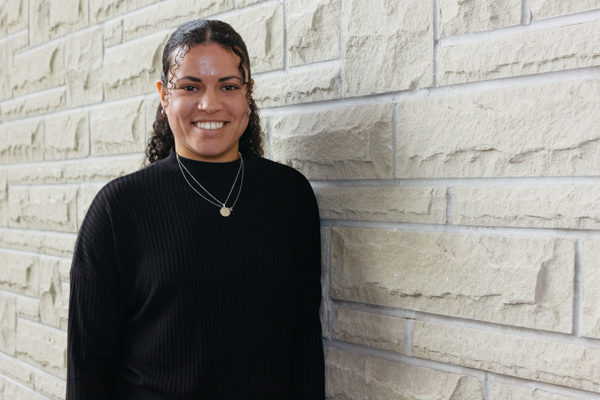Admissions
Equity, Diversity, Inclusion and Decolonization
The School of Graduate and Postdoctoral Studies is committed to equity, diversity, inclusion and decolonization in all aspects of graduate and postdoctoral studies. For more information regarding these commitments please visit grad.uwo.ca/edi-d.
Biomedical Engineering
Doctor of Philosophy (PhD)Meet Emma Donnelly, PhD candidate in Biomedical Engineering

Why did you come to Western for your graduate degree?
The ultimate appeal of Western for my graduate studies was collaborative opportunities and resources available right on campus. Western has a great network of partners and affiliations with clinicians and health care workers. With a hospital and sports medicine clinic right on campus, the opportunity to have health care professionals and facilities as a part of my research resources was a unique and invaluable opportunity considering my research interests and goals.
Describe your research.
I investigate the impact of differing surgical approaches in total knee replacement on the knee’s biomechanical behavior. I am specifically comparing robotic-assisted and conventional methods via biomechanical and medical imaging models.
What suggestion do you have for the Western graduate community?
Get involved! I understand it can be super daunting. I didn’t do my undergraduate degree at Western, but a lot of my peers who started graduate studies in my program the same semester as me did go here, so I felt a step behind in terms of being comfortable in the space. Joining an intramural team and attending events changed that for me.
What advice would you like to share?
Speak to current members of the lab(s) you are interested in working in. Every lab operates a little differently, so hearing about lab culture, expectations, and dynamics from someone who is living it can be very helpful. Don’t be afraid to be picky and find the fit that is right for you.
What one thing would you like people to know about you?
I am a black woman in engineering. While it doesn’t define me, it is one of the things I am most proud of.
Program Websites
Program Contact
bmeoffice@uwo.caProgram Coordinator
Biomedical Engineering Graduate Program
Western UniversityAmit Chakma Engineering Building, Room 2405
London, Ontario N6A 5B9
t. 519-661-2111 ext. 84288
The PhD in Biomedical Engineering offers specializations in Biomaterials, Biomechanics, Mechatronics, and Imaging.
Biomedical Engineering is a program that promotes the cooperative involvement of clinical and basic researchers in allied disciplines such as imaging, biomaterials, biomechanics and mechatronics. This program encourages multidisciplinary links between the faculties of Engineering, Medicine & Dentistry, and Health Sciences, Robarts Research Institute and London Health Research Institute, and Western’s teaching hospitals.

The Own Your Future doctoral professional development program will help you become a career-ready graduate with the skills necessary to excel in your studies and achieve your future goals. By participating in the program, you will assess your own strengths and opportunities for growth, choose what skills you want to enhance during your time at Western, and learn how to articulate the skills you gained in your degree to optimize your future career opportunities. To learn more, visit www.uwo.ca/ownyourfuture.
Program Length
- 12 Terms (Full-time studies)
- 18-24 Terms (Flex-time studies)
Program Design
- Full-time study and flex-time study
- Thesis-based
Funding Information
Applicants are encouraged to apply for the following scholarships (if eligible):
Tuition and Fees
Tuition and fee schedules (per term) are posted on the Office of the Registrar's website at http://www.registrar.uwo.ca/student_finances/fees_refunds/fee_schedules.html
Graduate Student Affordability Calculator
Use this helpful tool to estimate how much money you will need to pay for your tuition, fees, housing, food, and other necessities for a 12-month (three term) academic year.
Admission Requirements
- Minimum 80% (A-) average in the master's degree.
English Language Proficiency
Applicants whose first language is not English must furnish evidence of their proficiency in the use of the English language:
- The Test of English as a Foreign Language (TOEFL). The minimum acceptable score is 86, with no individual score below 20 for the internet based version; 213 for the standard electronic version; or 550 for the paper and pencil version, although some programs require a higher minimum score. [Western's TOEFL ID is 0984].
- The International English Language Testing Service (IELTS Academic). The minimum acceptable score is 6 out of 9, with no minimum score below 6.0. The IELTS is offered in 6 test centres in the US and 3 in Canada. <;i>The Canadian Academic English Language Assessment (CAEL Assessment). The minimum acceptable score is 60. The CAEL Assessment is offered in several countries throughout the world as well as Canada.
- Western English Language Centre Western's English Language Centre allows academically eligible students interested in pursuing a graduate degree at Western the opportunity to receive a conditional offer of admission to graduate studies without successful completion of an English language proficiency test. The condition is that the student must, in lieu of such a test, successfully complete Western English Language Centre's program. For more information, please visit http://englishlanguage.uwo.ca/.
- Fanshawe College’s ESL Program. The requirement is graduation from Level 10, English for Academic Purposes, with a minimum 80% in all components.
Application Deadline
- March 1 - Summer term
- July 1 - Fall term
- November 1 - Winter term
Fields of Research
- Biomaterials
- Biomechanics
- Imaging
- Mechatronics






